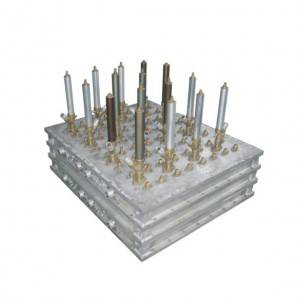Importance of Efficient Logistics in Foam Mould Shipping
Efficient logistics is crucial in the foam moulding industry, impacting both manufacturers and suppliers. The logistics process determines how quickly and safely foam moulds reach their destination, affecting customer satisfaction and overall business efficiency. The lightweight and bulky nature of foam products often requires specialized handling and shipping methods, emphasizing the need for an integrated logistics strategy. Successful logistics management ensures cost-effectiveness and timely delivery, both of which are critical in maintaining competitive advantage in the industry.
Challenges in Shipping Foam Moulds
Handling Bulky and Lightweight Cargo
Shipping foam moulds presents unique challenges due to their lightweight yet bulky nature. This characteristic increases the complexity of transportation logistics, as large volumes occupy substantial space without adding much weight. Efficient stacking and space optimization strategies are imperative to reduce transportation costs per unit and improve vehicle utilization rates.
Dealing with Fragility
Foam moulds require careful handling to prevent damage during transportation. Their delicate structure, while offering excellent cushioning properties, can be susceptible to tears and breakages. Suppliers must prioritize protective packaging and secure loading practices to ensure the integrity of the moulds upon arrival.
Strategies for Shipping Foam Moulds
Optimizing Packaging Solutions
Manufacturers and suppliers focus on designing custom packaging that fits the specific dimensions of foam moulds, minimizing excess space and reducing the risk of damage. Advanced packaging solutions, such as using pre-moulded foam cushions, help streamline the shipping process and enhance product protection.
Utilizing Advanced Tracking Systems
Adopting real-time tracking systems allows suppliers to monitor shipments throughout the delivery process. Detailed tracking information helps manufacturers keep clients informed about their order status, increasing transparency and trust while enabling quick responses to any logistical issues.
Role of Inventory Management in Foam Logistics
Just-in-Time Inventory Strategies
Just-in-time (JIT) inventory management reduces holding costs and aligns production with demand, minimizing waste and ensuring the timely availability of foam moulds. By aligning production schedules with delivery timelines, suppliers can enhance the efficiency of their logistics operations.
Forecasting Demand Accurately
Accurate demand forecasting is vital for effective inventory management. Suppliers use historical data and market analysis to anticipate demand fluctuations, adjust production schedules, and optimize stock levels, ensuring they meet customer requirements without overproduction.
Sustainability Practices in Foam Mould Shipping
Reducing Carbon Footprint
Sustainability is a growing concern in logistics, prompting foam mould suppliers to adopt eco-friendly transportation methods. Optimizing delivery routes and employing energy-efficient vehicles contribute to reducing the carbon footprint associated with shipping operations.
Recycling and Reusable Packaging
Suppliers increasingly focus on using recyclable and reusable materials for packaging, aligning with sustainability goals. By incorporating biodegradable materials, manufacturers reduce environmental impact and appeal to environmentally conscious consumers.
Impact of Technological Advancements on Logistics
Automation in Warehousing and Distribution
Technological advancements in automation streamline warehousing and distribution processes. Automated sorting and packing systems increase operational efficiency and accuracy, reducing the time and labor costs associated with manual handling.
Data-Driven Decision Making
Utilizing data analytics allows suppliers to enhance logistics decision-making. By analyzing transport patterns and warehouse operations, manufacturers and suppliers can identify inefficiencies and implement strategic improvements, contributing to optimized logistics performance.
Importance of Redundant Production Sites
Redundant production sites offer a strategic advantage, ensuring the continuity of supply chains despite disruptions. Manufacturers maintain multiple production locations to mitigate risks associated with localized shutdowns, labor shortages, and raw material disruptions. This redundancy allows suppliers to meet customer demands reliably, enhancing service levels and client satisfaction.
Partnerships and Collaboration in the Supply Chain
Building Robust Supplier Networks
Establishing strong partnerships with suppliers and logistics providers is essential in managing the foam mould supply chain effectively. Collaborative relationships foster coordination and communication, enabling seamless integration of production, transportation, and delivery processes.
Leveraging Regional Expertise
Partnering with local logistics providers allows manufacturers to leverage regional expertise and infrastructure, ensuring efficient shipping operations. Local partnerships help suppliers navigate regional regulations, optimize routes, and enhance delivery speed and reliability.
Handling Temperature-Sensitive Foam Products
Packaging Innovation for Temperature Control
Temperature-sensitive foam products require specialized packaging solutions to maintain optimal conditions during transit. Utilizing temperature-controlled packaging, such as insulated containers and phase-change materials, helps suppliers preserve product quality and prevent spoilage.
Implementing Climate-Controlled Storage
Suppliers integrate climate-controlled storage facilities into their logistics operations, safeguarding temperature-sensitive products against environmental variations. This controlled environment ensures the integrity of foam moulds during storage and prior to shipping.
Custom Solutions for Diverse Client Needs
Tailoring Packaging to Product Specifications
Manufacturers offer custom packaging solutions that meet the specific requirements of each client. By adapting packaging to the unique dimensions and fragility of foam moulds, suppliers enhance protection and optimize space utilization, ultimately improving shipping efficiency.
Flexible Logistics Models
Employing adaptable logistics models allows suppliers to cater to the diverse needs of their clients. By offering tailored shipping options, including expedited services and flexible delivery schedules, manufacturers enhance customer satisfaction and long-term partnership potential.
Dongshen Provide Solutions
Dongshen specializes in delivering comprehensive logistics solutions for foam mould manufacturers, factories, and suppliers. Our efficient shipping strategies prioritize cost-effectiveness and timely deliveries to ensure maximum client satisfaction. Dongshen's commitment to sustainability and cutting-edge technology integrates seamlessly with our flexible logistics models, allowing us to cater to diverse client needs. Our focus on innovation and collaboration strengthens our supply chain, positioning Dongshen as a trusted partner in the foam moulding industry.

